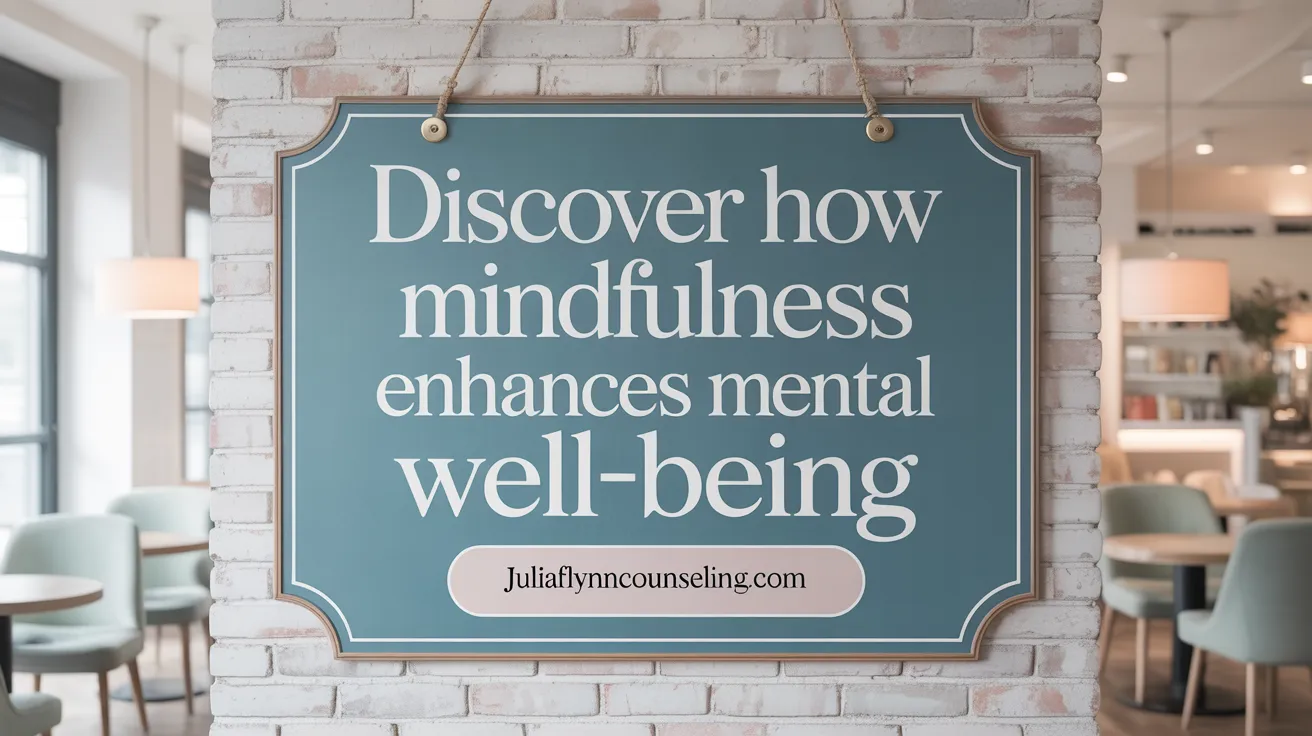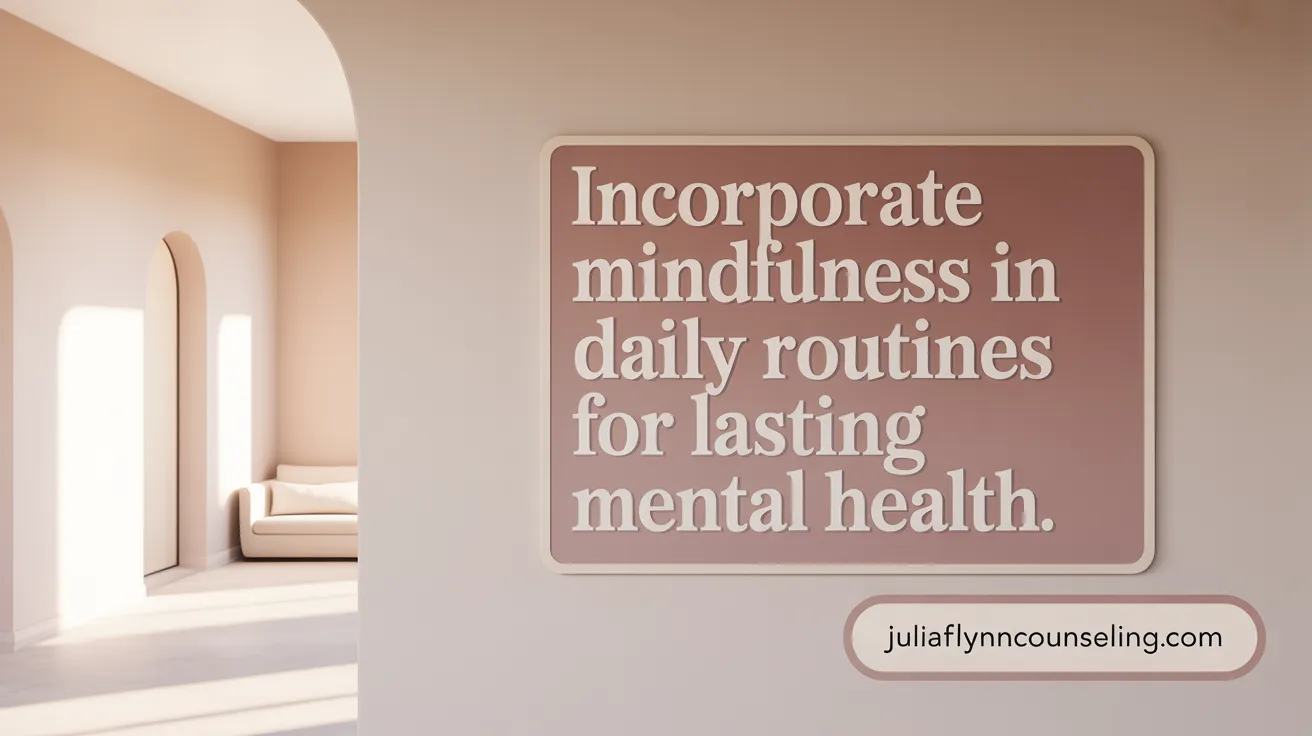Understanding Mindfulness and Its Mental Health Benefits
Mindfulness, a practice rooted in ancient meditation traditions, has surged in popularity as a vital tool for improving mental health. Defined as nonjudgmental awareness of the present moment, mindfulness can reduce stress, alleviate symptoms of anxiety and depression, and improve overall well-being. This article explores various mindfulness exercises and their evidence-supported effects on mental health, outlining practical approaches to incorporating mindfulness into daily routines for lasting psychological benefits.
What is Mindfulness and How Does it Benefit Mental Health?

What is mindfulness?
Mindfulness is the intentional, nonjudgmental focus on present-moment experiences. It requires awareness of sensations, emotions, and thoughts as they arise, with acceptance and without trying to change them. This mindset encourages living fully in the present and observing inner and outer experiences objectively. Learn more about what is mindfulness and core elements of mindfulness.
Scientific evidence of mindfulness benefits
A wealth of scientific studies supports mindfulness practice for mental health improvements. Research involving over 400 studies shows mindfulness effectively reduces symptoms of stress, anxiety, and depression. Programs like Mindfulness-Based Stress Reduction (MBSR) and Mindfulness-Based Cognitive Therapy (MBCT) demonstrate lasting benefits, including prevention of depression relapse. You can explore mindfulness and mental health for comprehensive insights.
Impact on stress, anxiety, depression, and cognitive functions
Mindfulness helps lower stress hormone (cortisol) levels and physiological stress responses like blood pressure. It reduces rumination—repeated negative thinking linked to depression—and eases anxiety symptoms. Enhanced cognitive functions such as attention span, working memory, and cognitive flexibility result from regular mindfulness practice, contributing to better emotional control. Read more on mindfulness for stress reduction and mindfulness and cognitive enhancement.
Mechanisms of mindfulness in emotional regulation
Mindfulness promotes self-compassion and nonjudgmental awareness, allowing individuals to observe thoughts and feelings without becoming overwhelmed. Brain imaging studies reveal mindfulness decreases activity in the amygdala, the brain's fear center, while increasing function in areas responsible for attentional control and emotion regulation. This neuroplasticity supports improved mood, reduced reactivity, and healthier coping with distress. For detailed mechanisms, see the PMC article on mindfulness effects on psychological health.
| Aspect | Description | Effect on Mental Health |
|---|---|---|
| Present-moment awareness | Focus on current sensations, emotions, thoughts without judgment. See mindfulness exercises for practical activities. | Enhances acceptance and reduces negative rumination. Explore mindfulness and self-compassion for emotional benefits. |
| Stress reduction | Lowers cortisol, blood pressure, and physiological stress responses through relaxation techniques. | Decreases anxiety and stress symptoms. Understand stress reduction with mindfulness. |
| Cognitive improvements | Boosts attention, working memory, cognitive flexibility by practicing mindfulness meditation. | Improves focus and emotional regulation. See mindfulness and concentration for enhancing mental skills. |
| Emotional regulation mechanisms | Increases self-compassion, decreases amygdala activation (fear center). Includes body scan meditation practice for body awareness. | Leads to better mood, less reactivity, and resilience. Explore emotional regulation through mindfulness for techniques and benefits. |
Effective Mindfulness Exercises to Reduce Stress and Enhance Well-being

What are effective mindfulness exercises?
Effective mindfulness exercises involve focusing your attention on the present moment with acceptance and a non-judgmental attitude. Some of the most beneficial exercises include:
-
Mindful Breathing: Concentrating on the sensation of breathing in and out, noticing the rhythm and flow without trying to change it. This practice helps ground the mind and calms the nervous system.
-
Body Scan Meditation: Slowly directing attention to different parts of the body—from feet to head and back—to become aware of bodily sensations, tension, or relaxation. This enhances body awareness and fosters a sense of peace.
-
Mindful Walking: Walking slowly while paying attention to the movement of the feet, the balance of the body, and the surrounding environment. This exercise encourages present-moment engagement and connection with nature or space.
-
Guided Imagery and Relaxation: Using visualization techniques to imagine peaceful settings or calming scenarios while engaging relaxation methods helps reduce stress and promote a deep state of rest.
The use of all five senses—such as attentively noticing sounds, smells, textures, tastes, and sights—serves as an anchor to the present moment and intensifies mindfulness practice. For more sensory mindfulness exercises, see Mindfulness Exercises and Techniques.
How often should mindfulness exercises be practiced for benefits?
Consistency is crucial for mindfulness practice to be effective. Daily engagement, even if for just a few minutes, is recommended. Ideally, practicing these exercises regularly over a period of about six months helps the benefits become more natural and effortless. This consistent practice can lead to enhancements in stress reduction, emotional regulation, improved sleep, and overall well-being.
Integrating mindfulness into daily routines—such as mindful eating, breathing breaks during work, or walking with focused attention—makes the practice sustainable and accessible. Structured mindfulness sessions should be done in quiet, distraction-free environments, while simpler exercises can be performed anytime or anywhere. For detailed information on incorporating mindfulness into daily life, see Mindfulness for Your Health.
By committing to regular mindfulness exercises, individuals can cultivate greater awareness, reduce anxiety, and foster a more balanced, resilient mental health state. To explore more about the benefits and practical guidance on mindfulness, visit How Mindfulness Can Help Improve Your Mental Health.
Mindfulness-Based Programs and Their Role in Treating Mental Health Conditions

What mindfulness-based programs exist for mental health?
Structured mindfulness programs such as Mindfulness-Based Stress Reduction (MBSR) and Mindfulness-Based Cognitive Therapy (MBCT) are widely recognized for their mental health benefits. MBSR, developed in the 1970s, integrates meditation, body scans, and mindful movement to cultivate present-moment awareness and acceptance. MBCT combines cognitive therapy principles with mindfulness techniques to specifically target depression relapse. These programs have shown effectiveness in reducing stress, anxiety, and symptoms of depression through enhancing emotional regulation and attention control (Effects of Mindfulness on Psychological Health).
What clinical evidence supports mindfulness for mental health conditions?
Extensive research, including randomized controlled trials, supports the use of these programs for various conditions:
- Depression: MBCT reduces relapse rates in individuals with recurrent depression, performing comparably to antidepressants.
- Anxiety: Both MBSR and MBCT decrease anxiety symptoms and cortisol levels, alleviating stress responses (Mindfulness meditation benefits).
- Post-Traumatic Stress Disorder (PTSD): Preliminary evidence suggests mindfulness aids coping by reducing emotional reactivity and promoting acceptance (Mindfulness and mental health).
- Chronic Pain: Mindfulness interventions lessen pain intensity and distress, improving quality of life (Mindfulness for pain management).
These findings highlight mindfulness as a versatile adjunct or alternative to pharmacological and talk therapies (Mindfulness and Therapies).
How are mindfulness programs integrated into healthcare settings?
Mindfulness programs are increasingly incorporated alongside traditional treatments in clinics, hospitals, and mental health services. They support patient self-management by fostering coping skills and psychological resilience (Caring for Your Mental Health). Healthcare professionals often recommend these programs as part of comprehensive care for conditions like depression, anxiety, and chronic illness. Digital delivery via apps and online courses further broadens accessibility.
What are the challenges and precautions in mindfulness practice?
While beneficial, mindfulness may not be suitable for everyone. Some individuals, particularly those with trauma history, bipolar disorder, or severe mental illness, may experience increased anxiety, emotional numbness, or flashbacks. Therefore, guidance from trained healthcare professionals is advised for safe practice (Mindfulness caution for trauma or PTSD). Challenges include initial difficulty maintaining focus, unrealistic expectations, and emotional discomfort during meditation. Consistent, gradual practice combined with professional support enhances safety and effectiveness (Mindfulness exercises and tips).
Incorporating Mindfulness into Everyday Life for Long-Term Mental Health

How can mindfulness be practiced in daily life?
Mindfulness is not limited to formal meditation; it can be woven seamlessly into everyday activities. Simple practices like mindful eating encourage focusing fully on the taste, texture, and aroma of food, turning a routine meal into a sensory experience. Attentive walking—whether outdoors or indoors—invites awareness of each step and the surrounding environment. Single-tasking where you dedicate your full attention to one task at a time, helps reduce mental clutter and boost present-moment awareness.
Engaging the senses is particularly powerful; activities like mindful listening to sounds or observing natural surroundings deepen connection to the present. These informal mindfulness practices promote a steady, nonjudgmental awareness throughout daily life, contributing to long-term mental well-being.
Using mindfulness in work, social, and home environments
Applying mindfulness at work can improve focus and lower stress. Taking brief mindful breathing breaks or practicing mindful communication encourages empathy and reduces burnout. At home, prioritizing presence during interactions with family or while performing chores enhances emotional connections and reduces distractions.
Social environments benefit from mindfulness that fosters attentive listening and acceptance, supporting healthier relationships. These practices encourage a calm, grounded perspective that can help manage the pressures of various life domains.
Role of nature and sensory engagement in mindfulness
Spending time in natural settings amplifies mindfulness benefits. Nature provides rich sensory input—like sounds of birds, rustling leaves, or fresh scents—that anchor attention effortlessly. Activities such as mindful hiking, meditative walking by the beach, or simply sitting outdoors can foster relaxation and reduce stress.
Interacting with natural environments encourages awareness of subtle sensory details that often go unnoticed, rekindling a sense of wonder and calm critical for mental health.
What resources can support mindfulness practice?
Accessibility to quality resources is key for sustaining a mindfulness practice. Numerous evidence-based apps provide guided meditations, breathing exercises, and reminders to cultivate daily mindfulness. Online programs and courses developed by reputable health and educational institutions offer structured paths and community support.
Books authored by mindfulness experts and free audio resources from organizations like the Oxford Mindfulness Centre enrich understanding and practice. These tools make mindfulness approachable, whether for beginners or those seeking to deepen their practice, and support integration into a busy lifestyle.
Regular engagement with these resources fosters consistency and helps transform mindfulness from a task into a natural, effortless state of being, supporting long-term mental health improvement.
Mindfulness, Emotional Regulation, and Enhancing Psychological Resilience
How does mindfulness improve emotional regulation?
Mindfulness practice involves paying close attention to the present moment with acceptance and without judgment. This approach enables individuals to become more aware of their emotions as they arise and to observe them without immediately reacting. By increasing this emotional awareness and fostering acceptance, mindfulness helps reduce automatic negative responses and rumination, which are linked to anxiety and depression. Learn more about mindfulness and emotion regulation.
Moreover, mindfulness cultivates self-compassion, allowing individuals to treat themselves with kindness during distress instead of self-criticism. This shift nurtures better emotional regulation and resilience, enabling people to respond to stressors in healthier ways and recover more effectively from emotional challenges. See mindfulness and self-compassion for detailed practices.
Reduction of rumination and improved self-compassion
Mindfulness interrupts cycles of repetitive negative thinking or rumination by encouraging a stance of nonjudgmental observation. This decentering from painful thoughts lessens their persuasive power. As a result, individuals experience lower levels of depressive symptoms and anxiety. Discover how mindfulness reduces rumination.
The practice also fosters greater self-compassion by teaching acceptance of one's feelings and imperfection. This compassionate outlook supports emotional recovery and reduces vulnerability to stress-related mental health problems. More on self-compassion through mindfulness.
What neurological changes support mindfulness benefits?
Scientific studies reveal that regular mindfulness practice produces significant neurological changes. These include increased gray matter density and activation in the prefrontal cortex, the brain region responsible for attentional control, decision-making, and emotion regulation. Review scientific evidence on mindfulness and brain changes.
Simultaneously, mindfulness reduces activity in the amygdala, the brain’s center for processing fear and emotional reactivity. This dual effect correlates with enhanced ability to focus, reduced stress responses, and diminished emotional overwhelm. Explore mindfulness meditation benefits on brain and stress.
Building emotional resilience and improving cognitive functions
Through consistent mindfulness practice, individuals strengthen cognitive abilities like working memory, cognitive flexibility, and sustained attention. These improvements support better problem-solving and emotional regulation during stress. See mindfulness for cognitive enhancement.
Enhanced emotional resilience from mindfulness allows people to face adversity with greater calm and control, reducing burnout and enhancing overall mental well-being. Read about mindfulness building resilience and reducing burnout.
Together, these effects demonstrate how mindfulness is a powerful tool for fostering mental health through the regulation of emotions and bolstering psychological resilience. For a broad overview, consult Mindfulness for Your Health.
Broader Mental Health Strategies Complementing Mindfulness Practice

What other lifestyle factors support mental health alongside mindfulness?
Mindfulness practice plays a vital role in mental wellness, but it is most effective when combined with other healthy lifestyle habits. Regular physical activity boosts mood and cognitive function, supporting resilience against stress. Quality sleep enhances emotional regulation and supports recovery from daily pressures. Balanced nutrition, especially diets rich in fruits, vegetables, nuts, and fish, positively influences brain health and mental clarity (Lifestyle to Support Mental Health).
Social connections are equally important; engaging with friends, family, and community strengthens emotional well-being and offers valuable support systems (Connecting with others). Practicing gratitude daily fosters positive thinking and shifts focus toward life’s meaningful aspects, enhancing overall life satisfaction (Practicing gratitude for better mental health).
When to seek professional mental health support?
While mindfulness and self-care contribute significantly to emotional balance, professional help is crucial when symptoms persist or worsen. Individuals experiencing severe or prolonged symptoms—such as changes in appetite, insomnia, loss of interest in activities, irritability, or significant mood shifts lasting two weeks or more—should consult mental health professionals. Primary care providers can offer referrals to psychologists, psychiatrists, or social workers, ensuring tailored support beyond mindfulness practice (Caring for Your Mental Health.
Role of self-care and professional support alongside mindfulness
Incorporating mindfulness within a wider framework of self-care—encompassing adequate rest, nutrition, exercise, and social support—creates a foundation for sustainable mental health. Professional intervention adds targeted therapies and resources for complex or severe conditions, complementing mindfulness techniques (Mindfulness meditation and professional mental health support.
Mindfulness's place within holistic mental health maintenance
Mindfulness is a valuable component in a holistic approach to mental health, emphasizing present-moment awareness and acceptance. When integrated with a healthy lifestyle, strong social bonds, gratitude, and professional care when needed, mindfulness helps build resilience, emotional regulation, and psychological well-being, supporting long-term mental health and quality of life (Benefits of Mindfulness.
Integrating Mindfulness for Lasting Mental Wellness
Mindfulness exercises provide accessible, evidence-based strategies for improving mental health by fostering present-moment awareness, emotional regulation, and resilience. When practiced regularly and combined with supportive lifestyle habits and professional guidance when needed, mindfulness can become a transformative element of holistic mental health care. Embracing mindfulness empowers individuals to navigate the complexities of mental health with greater clarity, self-compassion, and well-being, promoting lasting psychological balance and joy.
